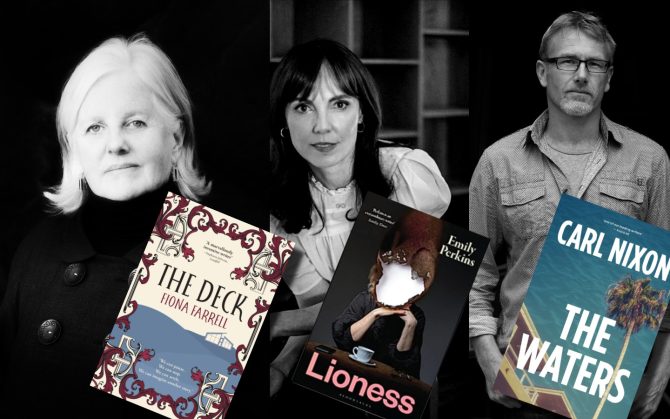"That evening they sit out on the deck as the sun sets in a glory of red and gold, great theatrical swags of colour that fade to deep blue as night washes into the valley. The moon hangs overhead, a pale disc, and the stars take up their appointed places as waka and the eyes of gods, or hunter and scorpion..."
I was excited to attend the April launch of The Deck at Scorpio Books. I'm a huge fan of Fiona Farrell, and not just because we share the same name.
The Deck is a book of biblical proportions, ghostly visitations and bawdy stories that come from the week-long isolation of a group of friends at a faraway beach bach.
In 1348, as the Black Death raged over Europe (commonly seen as the wrath of God, says Farrell), '...a group of young Florentines took to the countryside, pledging to each tell a story a day until their 'lockdown' is over.' These were recorded by Giovanni Boccaccio as The Decameron.
Reflecting our modern experience of pandemic, Farrell's book revisits Boccacio's idea. In The Deck, a bubble of friends gathers in an isolated bay to weather a storm of disease and social breakdown: to share "... the minutiae of private delight, private shame, the curiosity of strangeness or the comfort of recognition and a sense of shared humanity."
Its a great play on words: Deck/Decade/Decameron...
The Decameron's frame, or 'la cornice', was, says Farrell, "...the background of calamity and pestilience that lends these tales their power."
Farrell expounds on the Decameron's history as she creates her own 'frame' in response.
With the end of the world apparently nigh (we all felt that, didn't we?) each of the guests take stock of their lives, recounting stories and experiences after their evening meal on the deck. Farrell's narrator adds reflections on collective experiences that have led modern society to this moment.
Philippa, Tom, Ani (and her ghost husband, Leo), Pete, Didi, Baz, Maria and grand-daughter Zoe each tell their tales, in Decameron fashion. Each story begins with the subtitle:
"A tale of one who, after divers misadventures, at last attains a goal of unexpected felicity."
Many of the author's musings include the phrase: "It was the decade of..." adding: "colour television, feminism, nuclear protest..." This repeated motif gave me a chuckle.
The deck is the focal point of the book, but also a vantage point. From here our hostess Phillipa can see Baz (who has kept his figure) waxing his surfboard; who is on the beach, or water, or coming down the dirt road to the isolated bay.
"Beyond the harbour stretches the ocean, bordered as usual at the horizon by the mass of cloud that could be hills or snow-capped mountains. Air and vapour only but so seemingly solid that Captain Cook, sailing down the coast on his first voyage, detoured many miles to the east over three days in order to satisfy his lieutenant that this was no great continent. 'In search of Mr Gore's imaginary land,' he wrote grumpily in his journal. He himself was 'very certain we saw only clouds.'"
There is some beautiful language in this book, where land and people blend. Farrell speaks of "The Imaginary Land" in a way that brings Mansfield, or Janet Frame to mind - when character Philippa remembers from childhood, "...the cloudy mountains that were the place called overseas."
Farrell cracked herself up at the launch, reading the opening of the book which is aptly set in a supermarket - commenting on the omnipotence of being an author. The supermarket was the centre of the universe for many of us during lockdown - here it is also the symbol of climate breakdown:
"Rivers have dried to dustbowls to produce milk... Primeval jungle has been cleared to make way for soybean, rice and palm oil..."
It all gets a bit unexpectedly dramatic towards the end, but I'm not about to give it away. Farrell's ending does seem to reinforce her beginning concept, however, as she asks of her readers:
"Where can be the comfort of fiction when all the facts are pointing downward to annhiliation?"
In the midst of pandemics, climate destruction and war, the answer is distraction, affirmation, love, hope for a new beginning.
Fiona Farrell was introduced by publisher Glen Bush as "a writer at the height of her powers." I have to agree. The Deck is Farrell's eighth novel and her sixteenth book.
Fiona Farrell at WORD Christchurch 2023
Farrell will appear (along with Emily Perkins and Carl Nixon) at WORD Christchurch next month discussing The Deck in a session called Fiction, Three Ways:
Friday 25 August, 10.30am to 11.30am
The Piano (a livestream option is also available, opens a new window)





Add a comment to: Isolation and reflections: Fiona Farrell’s The Deck